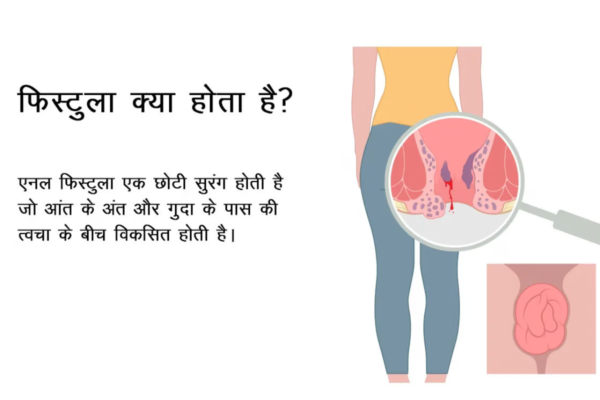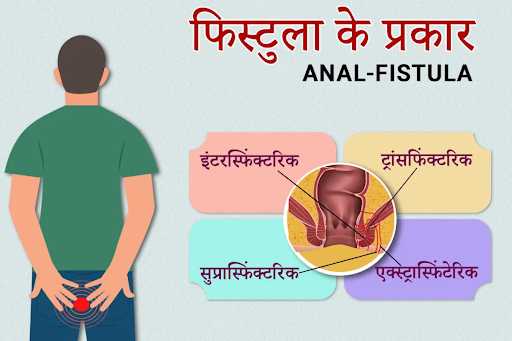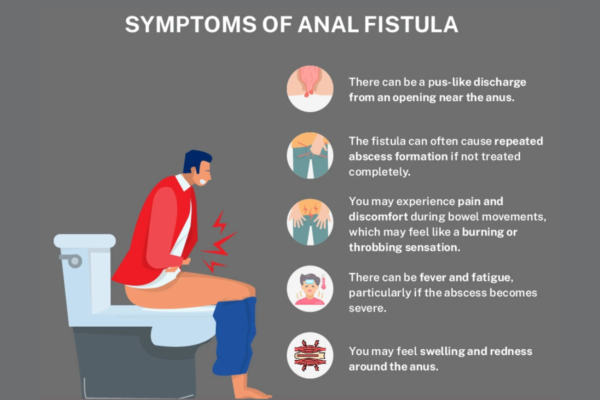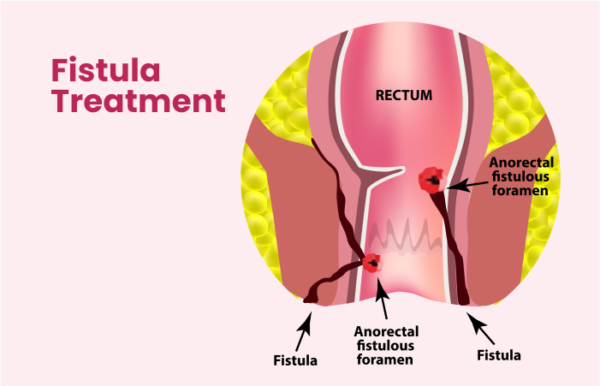
Fistula is a challenging condition that affects quality of life due to persistent pain, discharge, and potential infections. Homeopathic medicine for fistula offers a natural and holistic approach by addressing both symptoms and underlying causes. This guide provides detailed information about fistulas, symptoms, causes, and effective treatment options in homeopathy to help those seeking natural relief.
What is Fistula?
A fistula is an abnormal passage between two body parts, such as between two organs or between an organ and the skin. It often results from an infection, injury, or chronic inflammatory disease. When it forms, it can cause pain, discharge, and discomfort. Anal fistulas are particularly common, where a channel forms between the anal canal and the skin. Homeopathy treatment for fistula focuses on minimizing discomfort and supporting healing.

Types of Fistula
Fistulas can vary based on their location and which organs are involved. Here are the common types:
- Anal Fistula: A passage between the anal canal and the skin, often caused by infections or abscesses. Anal fistula treatment in homeopathy aims to relieve symptoms and address infection.
- Perianal Fistula: A specific type of anal fistula around the anus. This condition is often linked with inflammatory bowel diseases, like Crohn’s disease, and requires perianal fistula treatment in homeopathy to manage inflammation and pain.
- Enterovaginal Fistula: This forms between the intestines and vagina, often as a complication of childbirth or surgery.
- Rectovaginal Fistula: A channel between the rectum and vagina, which may develop due to infections or injuries during childbirth.
- Intestinal Fistula: This connects different parts of the intestines and can lead to severe digestive issues.
Each type of fistula may require a unique approach for fistula treatment in homeopathy, with remedies tailored to the specific symptoms and location.

Symptoms of Fistula
Common symptoms that indicate the presence of a fistula include:
- Pain and Discomfort: Persistent pain, especially when sitting, moving, or passing stool.
- Discharge: Pus or bloody discharge from the fistula opening, which may have an unpleasant odor.
- Swelling and Redness: Swelling around the area of the fistula, often accompanied by tenderness.
- Fever: A sign of an infection in more severe cases.
- Recurrent Abscesses: Abscesses that reappear, particularly in cases of anal or perianal fistulas, where an opening doesn’t heal completely.
If you’re experiencing these symptoms, homeopathy treatment for fistula can offer a gentle, effective solution by managing both symptoms and underlying causes.

Causes of Fistula
Fistulas can develop due to several underlying causes, including:
- Chronic Infections: Recurrent bacterial infections, tuberculosis, or sexually transmitted infections can lead to fistula formation.
- Inflammatory Bowel Diseases: Conditions like Crohn’s disease and ulcerative colitis are common triggers for fistulas, especially perianal ones.
- Complications from Surgery: Certain surgeries can lead to fistula development, particularly those affecting the digestive or urinary tract.
- Injuries: Trauma or childbirth-related injuries can cause fistulas, especially in cases of rectovaginal or enterovaginal fistulas.
- Cancer or Radiation Therapy: Rarely, certain cancers or radiation treatment can result in fistula formation.
Homeopathic treatment for fistula works holistically to address these root causes, alleviating symptoms while promoting healing.
Homeopathic Treatment for Fistula
Homeopathy treats the whole person, focusing on individual symptoms, lifestyle, and overall health. Fistula treatment in homeopathy targets both the physical symptoms and the emotional well-being of the patient, encouraging natural healing without invasive procedures. Homeopathy’s individualized remedies help reduce infection, inflammation, and pain, making it a powerful option for managing fistulas over the long term.

Homeopathy Medicine for Fistula
Homeopathic medicine for fistula includes remedies that relieve pain, reduce infection, and support the immune system. Here are some commonly used homeopathic medicines for fistula:
- Silicea – Often prescribed for chronic infections, Silicea aids in healing fistulas with recurring pus formation and tenderness.
- Hepar Sulphuris – Recommended for inflamed and painful abscesses, particularly when there is sensitivity around the fistula area.
- Calcarea Sulphurica – Effective when there is yellow, thick discharge; it supports wound healing and minimizes infection risk.
- Myristica Sebifera – Known as the “natural surgeon” in homeopathy, this remedy helps in draining pus and promoting healing naturally.
These remedies, combined with homeopathy treatment for fistula, work to relieve symptoms, reduce inflammation, and prevent further complications.
Disclaimer
The information shared about homeopathic medicine for fistula is intended for general knowledge only. It is not a substitute for professional medical advice or diagnosis. Always consult a qualified homeopathy or healthcare practitioner before starting any treatment. Results may vary depending on individual health conditions.
What Are Some Common Homeopathic Remedies for Fistula?
In addition to personalized treatment, some homeopathic remedies are frequently used to relieve fistula symptoms. These include:
- Paeonia Officinalis – Used for anal fistulas, especially when there is a burning sensation.
- Graphites – Recommended for sticky, glue-like discharge from the fistula, helpful in long-standing cases.
- Berberis Vulgaris – Eases sharp pains around the anal region, often helpful for perianal fistulas.
- Silicea and Calcarea Phosphorica – These remedies can be alternated to support wound healing and immune health, essential for persistent fistulas.
Each remedy in fistula homeopathy treatment is selected based on the specific symptoms, discharge characteristics, and overall health of the individual.
Diet and Lifestyle Adjustments for Managing Fistula
Incorporating diet and lifestyle changes can enhance the effectiveness of homeopathic treatment for fistula. Here are some essential tips:
- High-Fiber Diet: Including more fiber in the diet helps prevent constipation, which can ease pressure on the anal area and reduce discomfort.
- Hydration: Staying well-hydrated supports digestion and keeps stool soft, making it easier to pass without straining.
- Exercise Regularly: Moderate physical activity, like walking or yoga, can help improve digestion and circulation.
- Avoid Irritants: Limit caffeine, spicy foods, and alcohol, which may aggravate symptoms.
- Maintain Good Hygiene: Keeping the area clean can help prevent infection, which is especially important in perianal fistulas.
These adjustments, combined with perianal fistula treatment in homeopathy, can support healing and reduce symptom recurrence.

Conclusion
Fistulas are a chronic condition that often require a holistic treatment approach to ensure relief and prevent future complications. Homeopathy provides a natural and individualized approach to fistula treatment, using remedies that target both symptoms and underlying causes. With the right homeopathic treatment, dietary adjustments, and lifestyle changes, fistula sufferers can find relief and enhance their quality of life. If you’re exploring fistula homeopathy treatment, consult an experienced homeopath for a personalized plan that aligns with your specific health needs.